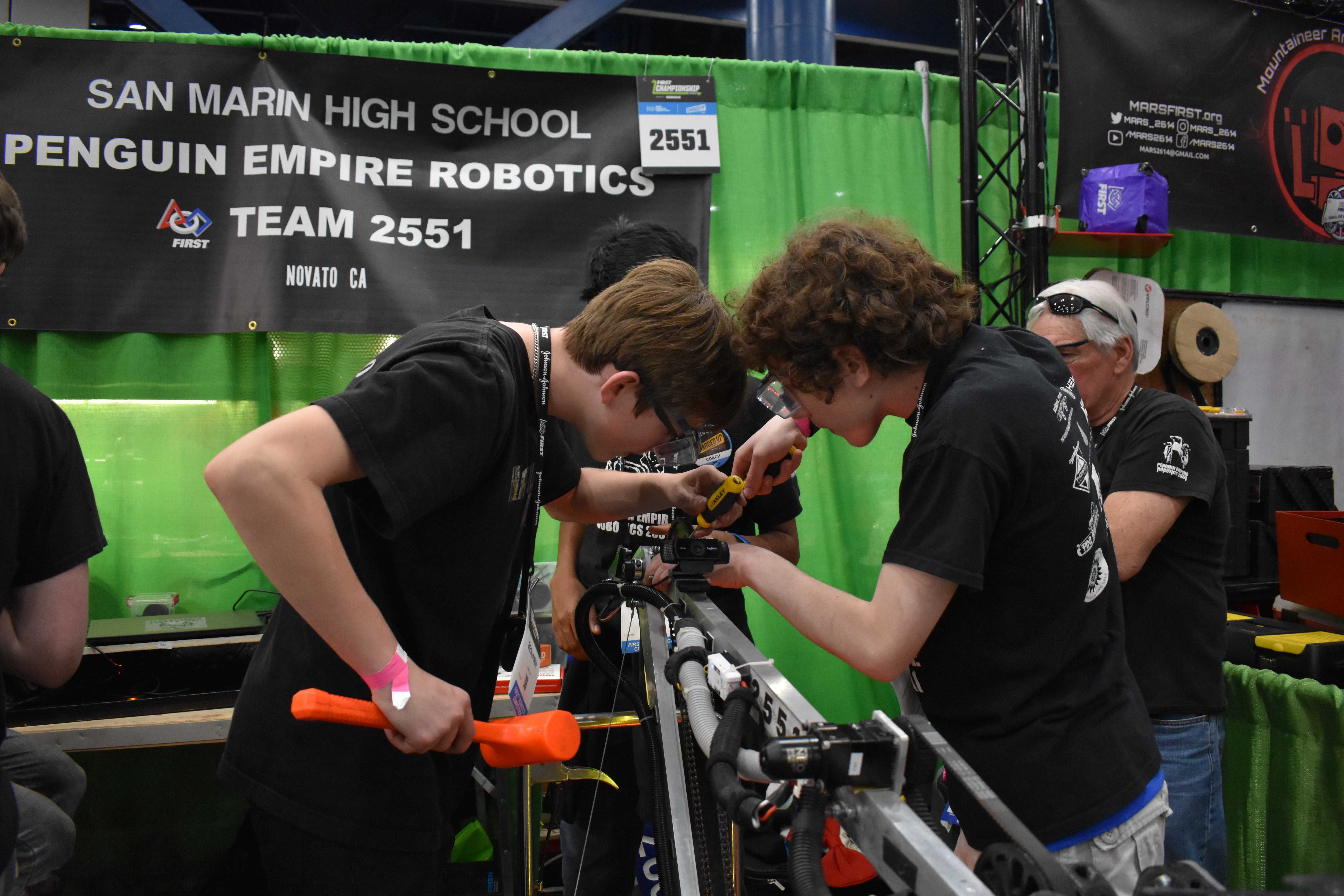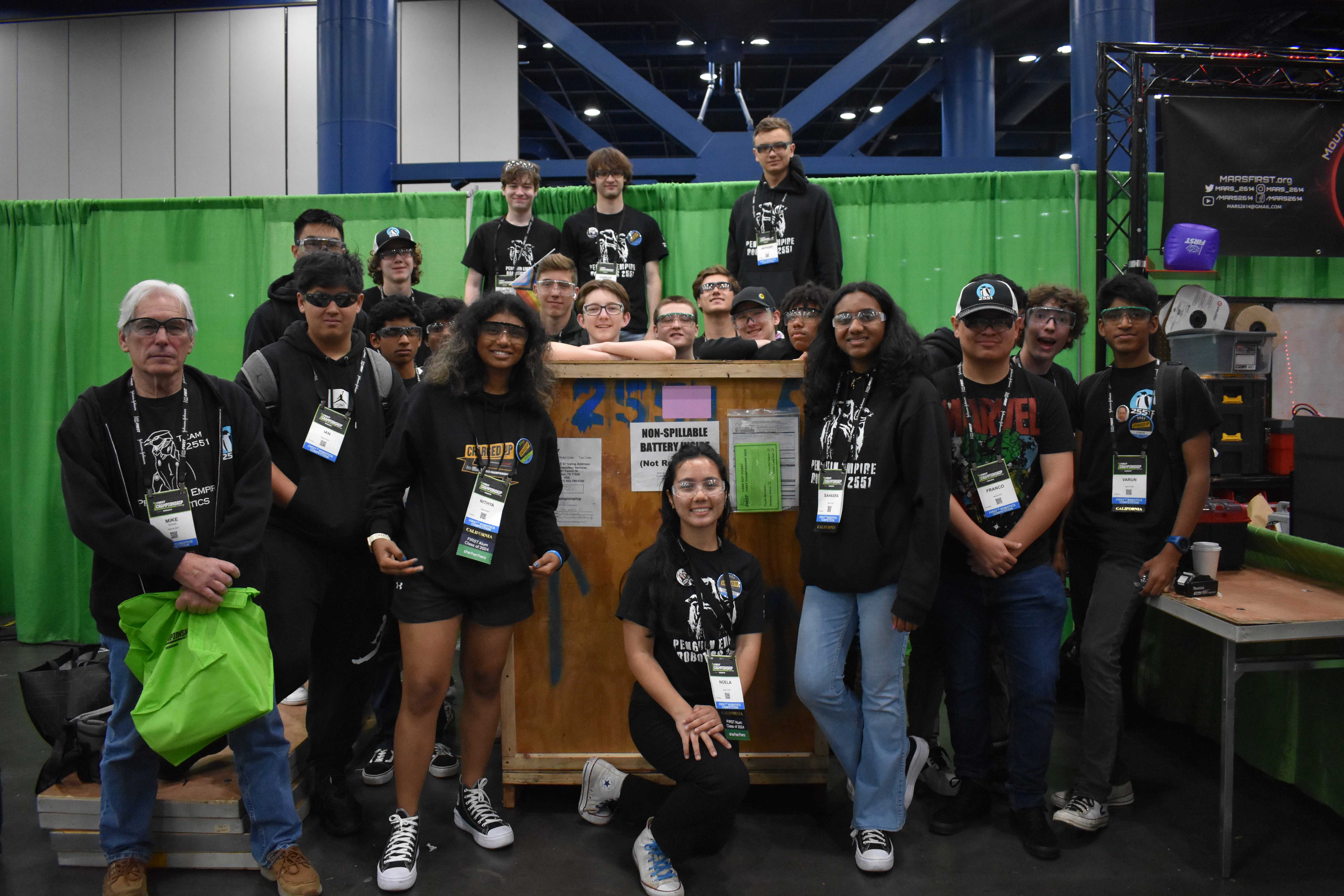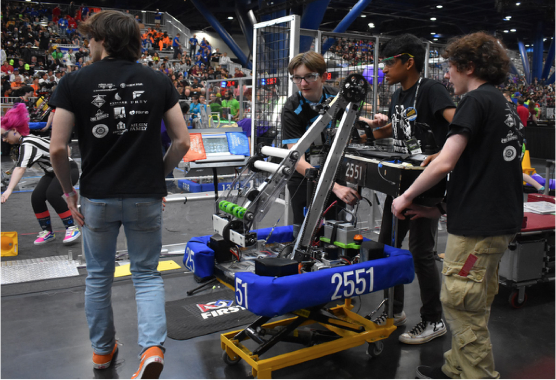Every year, approximately 600 teams travel from around the world to Houston, Texas to compete in the For Inspiration and Recognition of Science and Technology (FIRST) Robotics Competition. San Marin’s robotics club, Penguin Empire, found out that they would compete at the world championships in Houston after placing fourth in the Davis regional competition. The team competed in the Galileo division against 76 other teams.
FIRST challenges teams to strategize solutions for a new game each year. The teams complete the entire process, from brainstorming to building to programming final touches, within Jan. and Feb. This year’s challenge involved creating a robot with the abilities to pick up cones and cubes as well as balancing them.
The team used the weeks before the championship to fine tune their robot and strategy, preparing for the steeper competition. Junior Programmer and Safety Captain Nithya Sunku explained the process of improving the robot.

(From left) Sophomore Ben Tyler and junior Zane Marshall fine tune the team’s robot in between matches.
“We had two competitions before this: Fresno and Davis,” Sunku said. “We were constantly improving the robot based on things that we knew didn’t work when we competed there… Using what we learned from the previous competitions was really great because we knew what our strengths and weaknesses were.”
Mike Sousa is the main mentor for the team. He is a retired teacher who has now volunteered his own time to mentor Penguin Empire for 16 years.
“I’m so proud of the group and they just amazed me at how they are able to take this team and move it up to a world team.”
– Mike Sousa
Robotics team mentor
“I’m so proud of the group and they just amazed me at how they are able to take this team and move it up to a world class team,” Sousa said. “It’s such a rewarding experience and it happened by accident, that’s the crazy thing. It was just amazing and took it to another whole level.”
In addition to competing, the team was also able to find time for team bonding and conversing with other teams.
“There was a lot of team bonding as well as learning how to work together in a tighter, more scheduled and stressful situation,” Sunku said. “Because we were spending around 12 hours a day with each other, both at the competition and at dinners and hotels, we were constantly bonding over shared experiences. Even in the whole competition, people help each other out. Like some teams even 3-D printed parts for teams they were gonna go up against. The camaraderie was really amazing.”

Mentor Mike Sousa (left) and the Penguin Empire Robotics Team at the world championships in Houston, Texas. The team cites this as an important experience for team bonding, meeting new people, and learning new skills.
As bonding activities, the team organized group dinners and went to FIRST sponsored events like Robo-Prom, a semi-formal dance toward the end of the competition.
“I think that going to a dance as a group was really fun because we got to see each other outside of our ‘robotics selves’,” junior Scouting and Co-Strategy Captain Sahasra Kalluri said. “We all got to dress up, take photos, and have a fun night together. You would expect a dance at a robotics competition to be all ‘nerdy’ or something, but it’s not at all, we were all just teenagers partying and having a good time with our friends.”
Students from Australia, Israel, Iran, Mexico, Canada, India, China, and more came to compete at this event. This gave Penguin Empire members the opportunity to see different solutions to the same problem and meet people from different walks of life, all brought together by their shared interest in robotics.
“It really gave us a new perspective on how to play, how to prepare, and how to design our robots.”
– Anton Bogak
Senior
“We were playing with a lot of other teams that were either at or well above our skill level,” senior Rules and Co-Strategy Captain Anton Bogak said. “It really gave us a new perspective on how to play, how to prepare, and how to design our robots.”
Bogak also believes that the Houston Championship was the perfect way to end his senior year in Penguin Empire.
“It was definitely a great conclusion to my two, kind of three, since COVID messed some things up, years in robotics,” Bogak said. “It’s really great that I got to go there, especially because it’s my senior year and I thought that I’d never see the day.”
Although Penguin Empire placed 44 out of 77, the club members feel very proud of how far they have come and are optimistic going into next year. Juniors on the team are planning for the future of the club and hope to go to Houston again next year.
“We already have a lot of systems set in place for leadership in the club,” Kalluri said. “Once we have that settled, all of summer the returning members are going to be focusing on new members coming in. Using what we learned this year, we then get to do the whole process over again, and hopefully we can make it as far or farther than we did this year!”






































